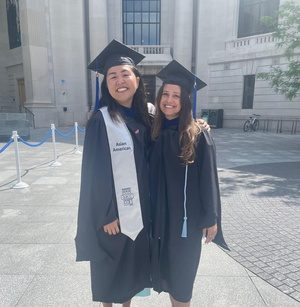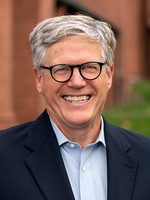Decoding the Role of the Civic Innovator
From education activist Malala Yousafzai to global water advocate Scott Harrison, civic innovators are tackling the world’s most pressing challenges. Whether through advocacy or impact investing, these leaders amplify voices and create groundbreaking solutions, pushing the boundaries of what’s possible. They are fearless, imaginative individuals forging new paths in social innovation.
A civic innovator is someone with both the vision and heart to solve problems. They identify opportunities to improve the well-being of people and the planet. With a determined focus on societal needs, they champion the rethinking and reshaping of social systems, transforming their innovative ideas into real-world solutions that benefit the greater good. Three changemakers in our community exemplify the core traits of civic innovators: community-oriented, creative, and compassionate. These individuals are catalysts for global change.
Community-oriented
Nicole Morrison (SOM ’25), founder of Win Number, is on a mission to make running for office more accessible. She believes that anyone who feels called to serve their community should feel empowered to run for office—demystifying the process and opening doors for more diverse participation.
Nicole’s background in political campaigns informs her approach to civic innovation, which she connects closely to civic responsibility. She asks, “How can we, as innovators, build companies that not only succeed but also strengthen institutions and restore faith in our democratic system?”
Win Number simplifies the traditionally complex and expensive process of running for office. Thereby, addressing electoral reform and increased political participation for underrepresented communities. By providing tools that help demystify political campaigns, Nicole is reshaping how individuals engage with democracy. This work helps amplify marginalized voices and fosters a more inclusive political landscape.
The platform’s democratizing efforts go beyond individual candidates. Win Number empowers those without access to traditional campaign resources, addressing the underrepresentation of minorities and low-income communities. Nicole’s vision is that success in civic innovation isn’t just about profit but fostering broader societal change. Her work reflects a growing movement toward a more equitable and transparent political process, ensuring that anyone, regardless of background, can contribute through public service.
Nicole shares, “I saw a problem, and I didn’t see anyone stepping up to solve it.” She encourages others to take the first step: “Even if you don’t have all the pieces together—people will help you.”
Creative
While Nicole is innovating democracy, Maggie Boreham (SOM ’24) is transforming fashion and sustainability through her venture, ThreadMap. Her company’s mission is to “enable a circular future for the fashion and apparel industry by providing brands with traceable data while creating an infrastructure for take-back, repair, and recycling programs.”

Maggie believes that creativity and community are at the heart of systemic change. For her, civic innovation means building solutions that benefit both society and the environment. ThreadMap tracks garments through their lifecycle, promoting transparency and accountability, minimizing waste, and encouraging responsible consumption.
Maggie’s journey began when she noticed the lack of transparency in the fashion industry, particularly around its human and environmental costs. By developing ThreadMap, she’s addressing these issues head-on. Her work reflects broader trends in sustainability and ethical production, reshaping global supply chains and reducing the fashion industry’s environmental impact.
As a designer and creative director, creativity drives Maggie’s work. She approaches problem-solving with a design-centric mindset, constantly asking, “How can we make things better?” Through continuous refinement and perseverance, she hopes ThreadMap will set new standards for sustainability and transparency in fashion.
Compassionate
Bill Goettler, Associate Dean for Ministerial and Social Leadership at Yale Divinity School, exemplifies compassion and justice in civic innovation. His work centers on addressing societal needs through collective action.“Civic innovators seek justice and compassion and positive change for the good of society,” he explains, underscoring how his advocacy is rooted in a vision for creating a better world.

At YDS, Bill works with students as they explore how to make a meaningful impact. His goal is to help them align their personal ambitions with service to their communities—whether through leadership, ministry, or social advocacy. This belief in the transformative power of community-driven action is at the heart of his leadership.
A pivotal moment in Bill’s journey as a civic innovator was starting a food co-op after college, where he witnessed first-hand the power of local organizing. The project not only addressed immediate needs but also demonstrated how intentional communities can drive long-term systemic improvements.
Bill’s work underscores that civic innovation extends beyond solving isolated issues–it’s about creating frameworks for collaborative, community-centered solutions. This bottom-up approach, which amplifies public voices, is vital for building equitable and resilient societies, especially in times of crisis.
Catalysts for Change
The journeys of Nicole, Maggie, and Bill demonstrate how civic innovators can ignite systemic change. They start by identifying opportunities that meet societal needs–, whether at the micro or macro level–with the potential to scale and inspire global movements toward more sustainable and equitable systems.
Nicole’s work with Win Number is an example of how political innovation can make running for office more accessible and improve the diversity of elected leaders. Her efforts ripple outward, influencing political innovators globally to adopt similar approaches. This could lead to a shift toward more inclusive and equitable political systems worldwide.
Maggie’s work in the fashion industry shows how addressing one segment of an industry can trigger broader change. ThreadMap’s commitment to sustainability and transparency fuels a larger movement for conscious consumption. Her efforts encourage industry leaders to rethink production, waste, and sustainability, driving a shift toward more responsible practices.
Bill’s leadership at Yale Divinity School exemplifies how civic innovation is rooted in compassion and justice. His early experiences with community organizing, combined with his ongoing mentorship of future leaders, highlight how individual action can create frameworks for collective problem-solving.
Together, Nicole, Maggie, and Bill illustrate that civic innovation transcends sectors. Whether through political reform, sustainable fashion, or educational leadership, their combined efforts drive society toward a more sustainable, equitable, and compassionate future.